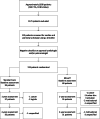Effect of an exercise intervention on global cognition after transient ischemic attack or minor stroke: the MoveIT randomized controlled trial
- PMID: 35927622
- PMCID: PMC9351151
- DOI: 10.1186/s12883-022-02805-z
Effect of an exercise intervention on global cognition after transient ischemic attack or minor stroke: the MoveIT randomized controlled trial
Abstract
Background: Patients with a transient ischemic attack (TIA) or ischemic stroke are at increased risk of developing cognitive impairment in the subacute phase. At present, the effects of exercise on cognitive functioning following a TIA or stroke are not fully known. The purpose of this trial was to investigate the effect of exercise on global cognition.
Methods: The MoveIT trial is a single-centre, observer-blinded, randomized controlled trial involving a 1-year exercise intervention consisting of a 12-week group exercise program, combined with three counselling visits to the physiotherapists over a 9-month period. The control group received standard care. The primary outcome was global cognitive functioning, assessed at one year, using the Montreal Cognitive Assessment (MoCA). Secondary outcomes included cardiorespiratory fitness, the cardiovascular profile, and attainment of secondary prevention targets, anxiety, depression and fatigue at one and two years.
Results: The experimental group consisted of 60 patients, while the control group consisted of 59 patients. The mean age was 64.3 years and 41% were female. No between-group differences were found on global cognitive functioning (MD, 0.7 out of 30, 95% CI, - 0.2 to 1.6) or on secondary outcome measures at 12 months. The only significant between-group difference was found for fatigue, in favour of the experimental group at 12 months (MD, 0.6 out of 63, 95% CI, 0.1 to 1.1).
Conclusions: No benefit of this exercise intervention was found regarding global cognition. Future studies need to focus on optimizing rehabilitation strategies for this vulnerable group of patients.
Trial registration: http://www.trialregister.nl . Unique identifier: NL3721 . Date first registration: 06-03-2013.
Keywords: Cognition; Ischemic stroke; Physical fitness training; Transient ischemic attack.
© 2022. The Author(s).
Conflict of interest statement
None declared.
Figures
Similar articles
-
A randomised controlled trial of aerobic exercise after transient ischaemic attack or minor stroke to prevent cognitive decline: the MoveIT study protocol.BMJ Open. 2014 Dec 31;4(12):e007065. doi: 10.1136/bmjopen-2014-007065. BMJ Open. 2014. PMID: 25552615 Free PMC article. Clinical Trial.
-
Effects of a 1 year aerobic and strength training on cognitive functioning after transient ischemic attack or minor stroke: A randomized controlled trial.J Stroke Cerebrovasc Dis. 2024 Jan;33(1):107441. doi: 10.1016/j.jstrokecerebrovasdis.2023.107441. Epub 2023 Nov 15. J Stroke Cerebrovasc Dis. 2024. PMID: 37966094 Clinical Trial.
-
Patient-Centered Outcomes in a Randomized Trial Investigating a Multimodal Prevention Program After Transient Ischemic Attack or Minor Stroke: The INSPiRE-TMS Trial.Stroke. 2022 Sep;53(9):2730-2738. doi: 10.1161/STROKEAHA.120.037503. Epub 2022 Jun 15. Stroke. 2022. PMID: 35703097 Clinical Trial.
-
Safety and feasibility of post-stroke care and exercise after minor ischemic stroke or transient ischemic attack: MotiveS & MoveIT.NeuroRehabilitation. 2014;34(3):401-7. doi: 10.3233/NRE-141049. NeuroRehabilitation. 2014. PMID: 24473242 Clinical Trial.
-
Increasing time spent engaging in moderate-to-vigorous physical activity by community-dwelling adults following a transient ischemic attack or non-disabling stroke: a systematic review.Disabil Rehabil. 2022 Feb;44(3):337-352. doi: 10.1080/09638288.2020.1768599. Epub 2020 Jun 1. Disabil Rehabil. 2022. PMID: 32478574
Cited by
-
Provision of information, secondary stroke prevention and holistic care for post-transient ischemic attack patients: A scoping review.Medicine (Baltimore). 2025 May 16;104(20):e42003. doi: 10.1097/MD.0000000000042003. Medicine (Baltimore). 2025. PMID: 40388759 Free PMC article.
-
Effects of exercise on patients with vascular cognitive impairment based on ACSM recommendations: a systematic review of randomized controlled trials.J Neurol. 2024 Dec 12;272(1):31. doi: 10.1007/s00415-024-12830-2. J Neurol. 2024. PMID: 39666076
-
The implementation of sex-and gender-based considerations in exercise-based randomized controlled trials in individuals with stroke: A cross-sectional study.PLoS One. 2024 Oct 9;19(10):e0308519. doi: 10.1371/journal.pone.0308519. eCollection 2024. PLoS One. 2024. PMID: 39383122 Free PMC article.
-
The effects of exercise interventions on depressive symptoms in stroke patients: a systematic review and meta-analysis.Front Physiol. 2025 Mar 17;16:1492221. doi: 10.3389/fphys.2025.1492221. eCollection 2025. Front Physiol. 2025. PMID: 40166715 Free PMC article.
-
Effectiveness of physical activity interventions on reducing perceived fatigue among adults with chronic conditions: a systematic review and meta-analysis of randomised controlled trials.Sci Rep. 2023 Sep 4;13(1):14582. doi: 10.1038/s41598-023-41075-8. Sci Rep. 2023. PMID: 37666869 Free PMC article.
References
-
- Ballard C, Rowan E, Stephens S, Kalaria R, Kenny RA. Prospective follow-up study between 3 and 15 months after stroke: improvements and decline in cognitive function among dementia-free stroke survivors >75 years of age. Stroke. 2003;34(10):2440–2444. doi: 10.1161/01.STR.0000089923.29724.CE. - DOI - PubMed
Publication types
MeSH terms
LinkOut - more resources
Full Text Sources
Medical


